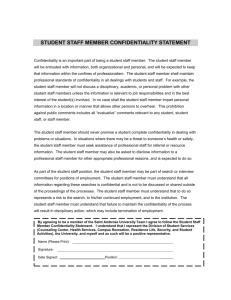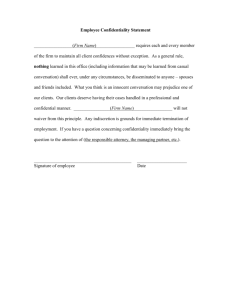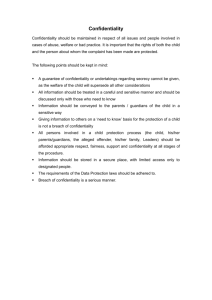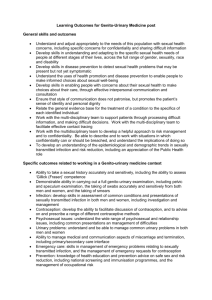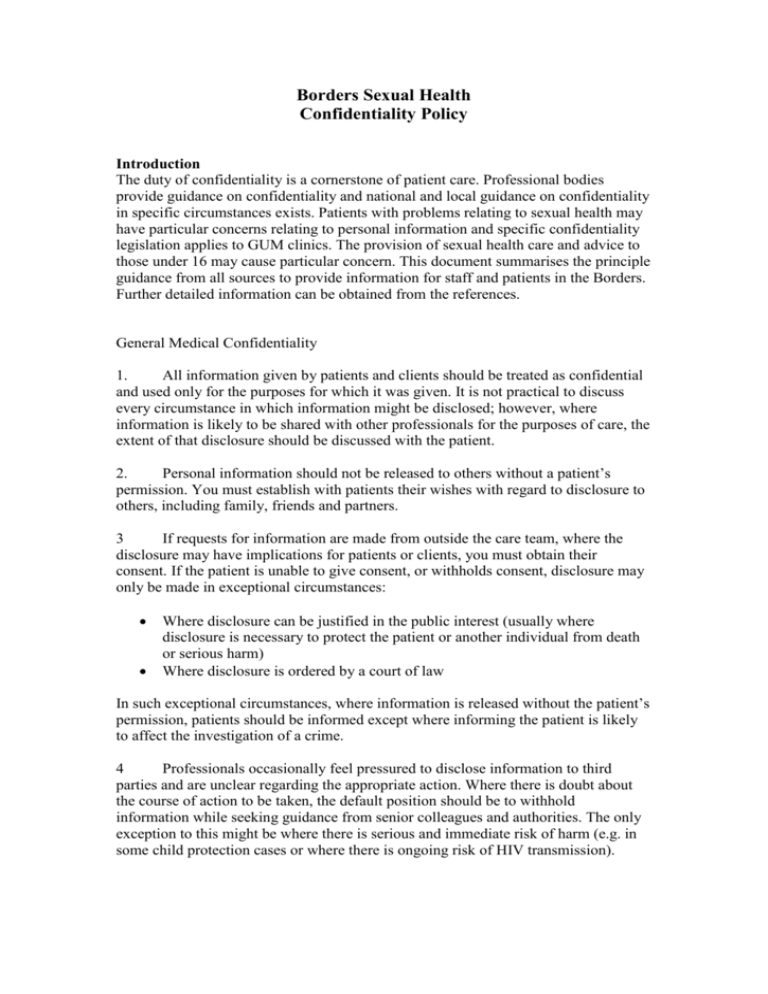
Borders Sexual Health
Confidentiality Policy
Introduction
The duty of confidentiality is a cornerstone of patient care. Professional bodies
provide guidance on confidentiality and national and local guidance on confidentiality
in specific circumstances exists. Patients with problems relating to sexual health may
have particular concerns relating to personal information and specific confidentiality
legislation applies to GUM clinics. The provision of sexual health care and advice to
those under 16 may cause particular concern. This document summarises the principle
guidance from all sources to provide information for staff and patients in the Borders.
Further detailed information can be obtained from the references.
General Medical Confidentiality
1.
All information given by patients and clients should be treated as confidential
and used only for the purposes for which it was given. It is not practical to discuss
every circumstance in which information might be disclosed; however, where
information is likely to be shared with other professionals for the purposes of care, the
extent of that disclosure should be discussed with the patient.
2.
Personal information should not be released to others without a patient’s
permission. You must establish with patients their wishes with regard to disclosure to
others, including family, friends and partners.
3
If requests for information are made from outside the care team, where the
disclosure may have implications for patients or clients, you must obtain their
consent. If the patient is unable to give consent, or withholds consent, disclosure may
only be made in exceptional circumstances:
Where disclosure can be justified in the public interest (usually where
disclosure is necessary to protect the patient or another individual from death
or serious harm)
Where disclosure is ordered by a court of law
In such exceptional circumstances, where information is released without the patient’s
permission, patients should be informed except where informing the patient is likely
to affect the investigation of a crime.
4
Professionals occasionally feel pressured to disclose information to third
parties and are unclear regarding the appropriate action. Where there is doubt about
the course of action to be taken, the default position should be to withhold
information while seeking guidance from senior colleagues and authorities. The only
exception to this might be where there is serious and immediate risk of harm (e.g. in
some child protection cases or where there is ongoing risk of HIV transmission).
Sexual Health
Patients with sexual health related problems may have particular concerns relating to
the disclosure of information to partners and others. Particular care may be needed in
handling confidentiality issues. For example, confirming a patient’s attendance at a
clinic may be regarded as harmless in other settings, but may constitute a serious
breach of confidentiality in sexual health.
1
General medical confidentiality applies to all sexual health consultations
delivered in all settings. No specific legislation or guidance applies to sexual health
care provided to adults. Good practice points include:
Obtain specific consent to contact the patient in case of a problem, and
the preferred means of doing so (eg phone, text, letter)
Where care is provided outside general practice, obtain specific
consent (usually through a registration form) on whether the patient
wishes the GP to be informed of their visit
Offer the patient copies of all correspondence sent and provide copies
where requested.
Do not disclose any information regarding a patients attendance at
clinic to a third party, including confirming or denying attendance.
Do not use patients or partners names to confirm identity (i.e ‘Could
you confirm your name’ rather than ‘Is that John Smith?’)
GUM (Genitourinary medicine) Clinic
Specific legislation (Venereal Diseases Regulations 1916 and subsequent acts) applies
to GUM clinics. Clinics in Scotland work under a Venereal Diseases Act. The main
practical aspects of the legislation includes:
Patient identity is anonymised through a system of code numbers. All samples
and specimens are identified by code number.
GPs are not routinely informed of a patient’s attendance. In the Borders, all
patients are asked specifically whether they wish their GP informed.
Patient records are held within the department and not in the main hospital
record. The hospital has no record of the patient’s attendance.
Computer records are held separately from the main hospital computer record
and can only be accessed by staff from the clinic.
Under 16s
More than a quarter of young people are sexually active before they reach 16.
Concern about confidentiality is the biggest deterrent to seeking advice on
contraception and sexual health. The duty of confidentiality owed to a person
under 16, in any setting is the same as that owed to any other person.
A doctor or other health professional is able to provide contraception, sexual and
reproductive health advice and treatment, without parental knowledge or consent, to a
young person under 16, provided that:
She/he understands the advice and its implications
His/her physical or mental health would otherwise be likely to suffer and so
provision of advice or treatment is in their best interest.
The Sexual Offences Act 2003 does not prevent this:
A person is not guilty aiding, abetting or counselling a sexual offence against a child
where they are acting for the purpose of:
Protecting a child from pregnancy or infection
Protecting the physical safety of a child
Promoting a child’s emotional well-being by the giving of advice
The law and professional guidance are clear that young people, including those under
the age of 13, are entitled to confidentiality when accessing sexual health services.
The fpa statement on the Bichard enquiry report is useful in this respect.
The following, based on the outcome of the Bichard report, is recommended practice
in the Borders:
Recommended Practice
In practice there has been a clear distinction between dealing with a
young person aged 13-16 who is technically only a victim having been
involved in a consensual relationship, and dealing with one who is the
victim of abuse.
Where the young person is 13 or under it is strongly recommended that
the case be referred to the Police at the Family Protection Unit.
The Bichard enquiry recommends that the decision on whether to refer
young people aged 13 to 16 should consider the following:
The age difference (if any) between the young person and the
other individual concerned.
The nature of the relationship between the young person and the
other individual concerned.
Whether the behaviour could be considered age/developmentally
appropriate.
How “consent” is actually understood by the young person.
How often and for how long the activity has been happening.
Whether there is any element of aggression involved.
Whether there is any element of coercion involved (coercion
includes implying that there will be a negative penalty or outcome
for the young person if they do not accede to sexual activity).
Whether there is any element of intimidation involved.
Whether there is any element of enticement involved.
Whether the other individual is known to have other sexual
partners particularly those that may also be “under age”.
Whether the sexual partner is known to any agencies (which
presupposes that checks will be made with the police)
Whether substances may have been used as a ‘disinhibitor’.
Whether the young person denies, accepts or minimises any cause
for concern.
Whether any aspect of the relationship might be consistent with
‘grooming’.
Assessing whether a young person can be provided with confidential services and
treatment without parental consent can be further assisted by the use of the Fraser
Guidelines:
A professional would be justified in giving treatment without parental knowledge,
provided the professional is satisfied that:
The young person understands the advice given
The young person cannot be persuaded to involve parents/carers or
allow the medical practitioner to do o on their behalf
It is likely that the young person will begin to or continue to have sex
with or without treatment or contraception.
Without treament the young persons physical or mental health is likely
to suffer
The young person’s best interest requires contraceptive advice,
treatment or supplies without parental consent
The young person can demonstrate that he/she is competent to give
consent, and
The young person’s decicion is made freely and without pressure
Information given to young people under 16 should include:
The fact that their confidentiality will be respected unless they or someone else is at
risk of death or serious harm.
Details of how information is kept in the service.
The circumstances under which information will be passed to the child protection
team and how this might be used.
Who the information might be shared with and under what circumstances. How
information might be shared within and outside the team.
How to make a complaint if they feel their confidentiality has been breached.
Where to get further advice (locally, through the Caldicott Guardian, or through the
Scottish Child Law Centre on 0131 667 6333)
References:
General Medical Council. Confidentiality: Protecting and providing information.
http://www.gmc-uk.org/standards/confidentiality.htm
Nursing and Midwifery Council. Advice on Confidentiality. http://www.nmcuk.org/nmc/main/advice/confidentiality2.html
Royal College of General Practitioners. Confidentiality. November 2000
Department of Health. Best Practice Guidance for Doctors and other Health
Professionals on the Provision of Advice and Treatment to Young People Under 16 on
Contraception, Sexual and Reproductive Health. Gateway reference number 3382,
29th July 2004.
Sandyford Initiative, Glasgow. Confidentiality Policy.
Sandyford Initiative, Glasgow. Supporting Sexually Active Young People
NHS Borders:Guidance for NHS Borders Health Staff: Children / Young People engaged in
underage sexual activity
Borders Sexual Health
UNDER 16?
Confidentiality Policy
If you are under 16, you may be concerned about talking to the doctor or
nurse about sex, contraception or sexually transmitted diseases. This is
our policy on confidentiality:
Doctors and other health professionals have a duty of care and a duty of
confidentiality to all patients, including under 16s. Everybody in this clinic,
including all the doctors, nurses, receptionists and secretaries has the same
strict responsibility to respect confidentiality.
This means we treat anything you tell us in confidence. We take this
responsibility very seriously. Everybody in this clinic respects the choices
young people make about their lives, including their sex lives.
We don’t routinely tell social workers, police, parents, your doctor or anyone
else, just because someone is having sex under the age of 16.
We do have a responsibility to protect young people from harm – such as
physical or sexual abuse. This means that we occasionally have to discuss a
young persons care with other professionals, such as the nurse and social
workers at the Family Protection Unit. The family protection unit is a special
team that work to stop young people being abused or harmed.
We might do this if we think that you (or someone else – say a brother or
sister) are in danger of coming to harm, for example:
Someone is forcing you to have sex against your will
Someone is hurting or harming you in another way
Someone is taking advantage of their position (such as a youth worker
or relative) to have sex with you.
The younger a person is, the more likely it is that we might be concerned.
If the doctors or nurses at this clinic think that a young person might be in
danger, we will discuss what we plan to do with you. We will always
inform you before discussing anything about you with another professional.
If you want to know more about confidentiality, you can ask the nurse or
doctor before you discuss your problems.
You can ask to read our confidentiality policy
You can phone the Childrens Law Centre on 0131 667 6333




